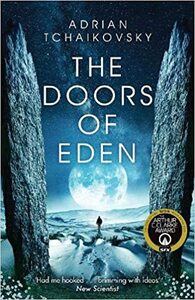Take a photo of a barcode or cover
adventurous
emotional
hopeful
informative
fast-paced
Parallel worldlines / cracks opening up between universes is a trope I love, and this was a generally successful execution of it. Tchaikovsky did a decent job of writing some suitably alien-seeming societies (I loved Doctor Rat in particular), and I appreciated how structurally wacky things started to get towards the end. If I were the editor, though, I would have gotten rid of the interludes entirely.
Thank you Tor Books and NetGalley for sending me a copy of this book.
I'm not sure what I expected from this book but it definitely wasn't what I got; i hadn't expected the whole parallel worlds and so it kind of threw me off and made me realise they just aren't my thing, especially when mixed with MI5??
I had to DNF this book because I just wasn't enjoying it and honestly it sent me into such a massive reading slump I have barely picked up a book for the last two weeks. I just couldn't get into it at all and feel like i needed to just leave it be and realise it's not for me.
I'm not sure what I expected from this book but it definitely wasn't what I got; i hadn't expected the whole parallel worlds and so it kind of threw me off and made me realise they just aren't my thing, especially when mixed with MI5??
I had to DNF this book because I just wasn't enjoying it and honestly it sent me into such a massive reading slump I have barely picked up a book for the last two weeks. I just couldn't get into it at all and feel like i needed to just leave it be and realise it's not for me.
Tchaikovsky has become one of my favorite sci-fi authors. His unique penchant for building worlds filled with sentient bugs, supercomputers made of ice, and cavemen druid scientists is really imaginative. I'd recommend any of his works that I've read.
mysterious
slow-paced
Plot or Character Driven:
A mix
Strong character development:
Complicated
Loveable characters:
Complicated
Diverse cast of characters:
Yes
Flaws of characters a main focus:
Complicated
adventurous
fast-paced
Plot or Character Driven:
Plot
Strong character development:
No
Loveable characters:
Yes
Diverse cast of characters:
Yes
Flaws of characters a main focus:
No
adventurous
mysterious
tense
medium-paced
Plot or Character Driven:
A mix
Strong character development:
Yes
Loveable characters:
Yes
Diverse cast of characters:
Yes
While cryptid hunting on Bodwin Moor, young friends and lovers Mal and Lee get separated after an encounter where three standing stones become six and midsummer Cornwall suddenly becomes a much colder scarier place. Mal goes missing, presumably wherever the cold other three stones are and with the monstrous inhabitants of that place. Lee manages to go on with her life until four years later, out of the blue, she gets a call from Mal who has some strange new friends.
MI5 analyst Julian Sabreur and his friend and colleague Alison Matchell have discovered an imminent attack on theoretical physicist Kay Amal Khan. Only the attack is stopped, brutally so, in ways that don't appear entirely human and have nothing to do with MI5.
To explain what's happening here is to spoil most of the delight of this book. It starts off in various disparate corners and is punctuated with readings from a very odd textbook (which I would love to read) called "Other Edens" and speculates about possible intelligences on Earth that arise during various historic ages. It does all come together, delightfully so, and ends on a note that might be familiar from some of this author's other works.
And as usual, my main complaint with this author's work is I just want more. I'd love to see where the story goes next.
MI5 analyst Julian Sabreur and his friend and colleague Alison Matchell have discovered an imminent attack on theoretical physicist Kay Amal Khan. Only the attack is stopped, brutally so, in ways that don't appear entirely human and have nothing to do with MI5.
To explain what's happening here is to spoil most of the delight of this book. It starts off in various disparate corners and is punctuated with readings from a very odd textbook (which I would love to read) called "Other Edens" and speculates about possible intelligences on Earth that arise during various historic ages. It does all come together, delightfully so, and ends on a note that might be familiar from some of this author's other works.
And as usual, my main complaint with this author's work is I just want more. I'd love to see where the story goes next.
A fucking reality grenade! *lol*
Imagine a universe in which there are myriad Earths. Every parallel Earth is different with different dominant species. Imagine all these branching timelines being done on purpose to find what works best. You know, evolution but on a whole new level. This is the universe of this book.

In the beginning, two English girls are in love and love hunting monsters (think Nessie or Big Foot). One day, they go to Bodmin Moor and one of them, Mal, disappears. But she‘s not dead as everyone had feared. However, when she resurfaces 4 years later, she‘s changed and she hasn‘t come alone.
Suddenly, „agents“ walk our Earth and there appear to be more and more cracks between the different Edens/Earths resulting in different dominant species clashing with each other. Because something is coming and it will end every single Eden/Earth if not stopped. But for anyone to be able to stop it, one must first know what „it“ is. You know, knowledge being power.
Kidnapped scientists, „wayfarers“ between the Edens, mysterious lectures as interludes between the chapters - this book was full of great scientific concepts and fascinating what-ifs.
It‘s really hard trying to sum up this book, especially since I don‘t want to give away too much. Suffice it to say that there is an interesting group of characters of different species all trying to untangle timelines and figuring out the respective evolution for each Eden/Earth. Their interactions are indeed interesting but nothing compared to the discoveries. I seriously loved all the what-ifs, such as a global ice sheet being a supercomputer on one Earth or communist cavemen or one dominant species not actually being the big bad hunter but the big bad hunter being used by a sort of symbiont/parasite.
The truly big question, though, is: is there a plan behind it all? Is there an original Earth? A Universe #0? Is there a sort of creator (don‘t think God, think scientists with a lab experiment or think accident)?
Following the discoveries, the breadcrumbs so to speak, was seriously cool and I adore the author for how he handled the alternate-Earth-trope.
It is noteworthy, however, that on top of all of this the author also managed to include his typical examination of different human psychologies (mostly thanks to Rov). No matter where you look, the story is deep and rich.
Add to that a wonderful array of literary references that always please this little bookworm‘s heart as well as a fast-paced plot that had me hooked from start to finish and you have one of the best scifi books I‘ve read. This should be right up there with the big names, honestly! How this hasn‘t won more than just the one award is a mystery to me but maybe intelligent scifi is out of style right now. I can only hope that will change again and that this book will not have been forgotten until then. It would be a great loss.
Imagine a universe in which there are myriad Earths. Every parallel Earth is different with different dominant species. Imagine all these branching timelines being done on purpose to find what works best. You know, evolution but on a whole new level. This is the universe of this book.

In the beginning, two English girls are in love and love hunting monsters (think Nessie or Big Foot). One day, they go to Bodmin Moor and one of them, Mal, disappears. But she‘s not dead as everyone had feared. However, when she resurfaces 4 years later, she‘s changed and she hasn‘t come alone.
Suddenly, „agents“ walk our Earth and there appear to be more and more cracks between the different Edens/Earths resulting in different dominant species clashing with each other. Because something is coming and it will end every single Eden/Earth if not stopped. But for anyone to be able to stop it, one must first know what „it“ is. You know, knowledge being power.
Kidnapped scientists, „wayfarers“ between the Edens, mysterious lectures as interludes between the chapters - this book was full of great scientific concepts and fascinating what-ifs.
It‘s really hard trying to sum up this book, especially since I don‘t want to give away too much. Suffice it to say that there is an interesting group of characters of different species all trying to untangle timelines and figuring out the respective evolution for each Eden/Earth. Their interactions are indeed interesting but nothing compared to the discoveries. I seriously loved all the what-ifs, such as a global ice sheet being a supercomputer on one Earth or communist cavemen or one dominant species not actually being the big bad hunter but the big bad hunter being used by a sort of symbiont/parasite.
The truly big question, though, is: is there a plan behind it all? Is there an original Earth? A Universe #0? Is there a sort of creator (don‘t think God, think scientists with a lab experiment or think accident)?
Following the discoveries, the breadcrumbs so to speak, was seriously cool and I adore the author for how he handled the alternate-Earth-trope.
It is noteworthy, however, that on top of all of this the author also managed to include his typical examination of different human psychologies (mostly thanks to Rov). No matter where you look, the story is deep and rich.
Add to that a wonderful array of literary references that always please this little bookworm‘s heart as well as a fast-paced plot that had me hooked from start to finish and you have one of the best scifi books I‘ve read. This should be right up there with the big names, honestly! How this hasn‘t won more than just the one award is a mystery to me but maybe intelligent scifi is out of style right now. I can only hope that will change again and that this book will not have been forgotten until then. It would be a great loss.
Tchaikovsky, Adrian. The Doors of Eden. Tor, 2020.
There is a familiar science fiction subgenre that plays games with alternate history. Adrian Tchaikovsky does not do alternate history but rather alternate evolution. In his previous novels he has evolved squids and spiders to cognitive sentience. In Doors of Eden, he opens up the whole evolutionary toybox. We have space-faring trilobites and villages of friendly dinosaurs, just for starters. The plot begins with two young lesbians using their vacations to pursue strange animal sightings. They get a good deal more than they bargained for. The story is suspenseful with plenty of action and well-drawn characters. It is tighter and more controlled than anything Tchaikovsky has done so far. Highly recommended.
There is a familiar science fiction subgenre that plays games with alternate history. Adrian Tchaikovsky does not do alternate history but rather alternate evolution. In his previous novels he has evolved squids and spiders to cognitive sentience. In Doors of Eden, he opens up the whole evolutionary toybox. We have space-faring trilobites and villages of friendly dinosaurs, just for starters. The plot begins with two young lesbians using their vacations to pursue strange animal sightings. They get a good deal more than they bargained for. The story is suspenseful with plenty of action and well-drawn characters. It is tighter and more controlled than anything Tchaikovsky has done so far. Highly recommended.





